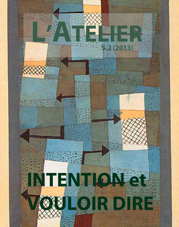Framing Significance in John Banville's The Book of Evidence
Mots-clés :
Banville, Frame SemanticsRésumé
John Banville’s The Book of Evidence has been hailed as an existentialist novel whose anti-hero tries to make sense of a meaningless murder through his retrospective confession. The notions of intentional action and illocutionary act run parallel in the novel, through the embedded intrigues of Freddy’s crimes and his convoluted, unreliable narrative. Banville addresses the problem of meaning through a philosophy of linguistic action based on intentionality, but he also pits the notion of authorial responsibility against that of the intrinsic power of the work of art, in the form of the mysterious Dutch painting which prompts Freddy’s killing rage.
This article examines the question of intentional meaning in The Book of Evidence through Banville’s recurring metaphor of the frame, from the linguistic perspective of Frame semantics. In the novel, the ambiguous first-person narrator is both an author burdened with the consciousness of his criminal and manipulative intent, and an aimless drifter subjected to linguistic, cultural and social frames he cannot escape, even after he commits the ultimate transgression. The Book of Evidence finally presents us with a series of jarring frames, through its constant meta-narrative irony, so that its self-proclaimed indictment of the author is ultimately a testimony to the complexity of fiction.
The Book of Evidence de John Banville est généralement considéré comme un roman existentialiste dont le héros cherche la rédemption à travers le récit de son crime. La notion d’intentionnalité est centrale dans le roman, tant en ce qui concerne les actions que les discours de son narrateur. Banville aborde la question du sens à travers une philosophie de la responsabilité et oppose la figure de l’auteur à celle de l’oeuvre d’art autonome, dans la rencontre entre son anti-héros, Freddie, et le tableau mystérieux dont la puissance évocatrice pousse au meurtre.
Cet article examine la question de l’intentionnalité et du sens dans The Book of Evidence, en s’appuyant sur la métaphore du cadre, présente à tous les niveaux du roman, et à travers la perspective théorique de la sémantique des cadres (Frame Semantics). Le héros-narrateur de The Book of Evidence est à la fois un auteur subissant le poids de sa responsabilité et un témoin passif de sa propre vie, soumis à des cadres de compréhension définis, linguistiques, culturels et sociaux auxquels il ne peut se soustraire. Le roman offre finalement une réflexion sur le statut de la fiction, sa relation complexe avec la réalité, et sa fonction cognitive essentielle à notre compréhension du monde.
Publiée
Numéro
Rubrique
Licence
-
L’envoi spontané d’un article à la rédaction de L’Atelier implique l’autorisation de publication et la cession des droits dans les limites établies par la loi de propriété intellectuelle.
-
L’Atelier conserve les droits de reproduction des articles publiés, quelque soit le support : internet, CD ROM, réimpression, photocopie, etc.
-
L’auteur conserve le droit de publier ultérieurement son article déjà paru dans L’Atelier avec la seule obligation de mentionner le nom de la revue comme source de la première publication.


